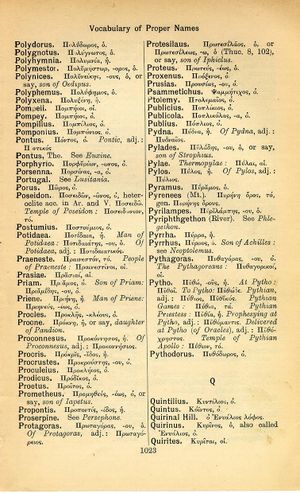Polyhymnia: Difference between revisions
From LSJ
Τῶν εὐτυχούντων πάντες ἄνθρωποι φίλοι → Homines amici sunt omnes felicibus → Nur derer, die im Glück sind, Freund ist jeder Mensch
m (Text replacement - "link={{" to "link={{") |
m (Text replacement - "(|thumb)\n(\|link=)" to "$1$2") |
||
| Line 1: | Line 1: | ||
{{WoodhouseENELnames | {{WoodhouseENELnames | ||
|Text=[[File:woodhouse_1023.jpg|thumb | |Text=[[File:woodhouse_1023.jpg|thumb|link={{filepath:woodhouse_1023.jpg}}]]Πολυμνία, ἡ. | ||
|link={{filepath:woodhouse_1023.jpg}}]]Πολυμνία, ἡ. | |||
}} | }} | ||
{{Lewis | {{Lewis | ||
Revision as of 16:55, 18 May 2020
English > Greek (Woodhouse)
Πολυμνία, ἡ.
Latin > English (Lewis & Short)
Pŏlyhymnĭa: (Pŏlymnĭa, Poët. ap. Anth. Lat. 1, p. 51 Burm.), ae, f., = Πολυμνία (she of many hymns),
I one of the Muses, Hor. C. 1, 1, 33; Ov. F. 5, 9; Mart. 4, 31, 7; Aus. Idyll. 20.
Latin > French (Gaffiot 2016)
Pŏlўhymnĭa, æ, f. (Πολύμνια), Polymnie [muse des rythmes multiples] : Hor. O. 1, 1, 33 ; Ov. F. 5, 9.
Latin > German (Georges)
Polyhymnia, ae, f. (griech. Πολύμνια, dah. auch lat. Polymnia, Auson. edyll. 20, 7. p. 251 Schenkl), die Gesangreiche, eine der Musen, Hor. carm. 1, 1, 33. Ov. fast. 5, 9. Mart. 4, 31, 7.

